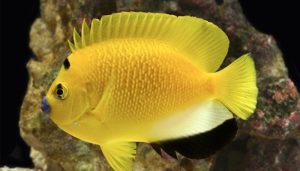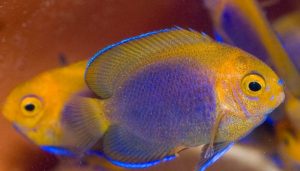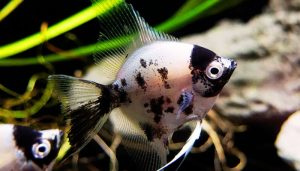You’re in the right place if you’ve been curious about guppies and their birthing habits. These tiny tropical fish may look delicate but are resilient regarding reproduction. But how many babies do guppies have at once?
Guppies are undoubtedly cute, but do you know how many fry do guppies have at a time? Are you ready for the responsibility, especially when providing adequate space for your new fishy family? Let’s see.
Suppose you have a guppy tank at home. In that case, this post will provide insight into how many babies guppies can have, what conditions allow for large broods, and guidelines on when and how to separate the baby from adult guppy fish inhabitants.
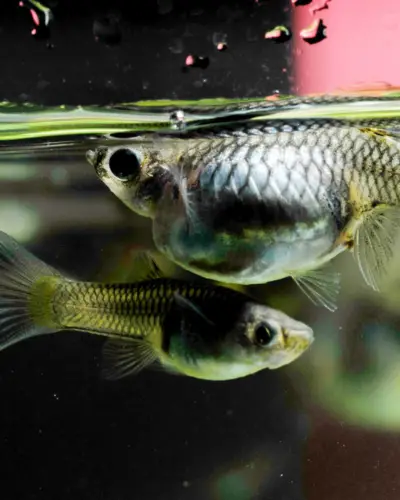
We all want to own fish and make them part of our family, but we also need to know how quickly they reproduce.
Get your netted cup ready as we dive deeper into the fascinating world of underwater life!
Table of Contents
ToggleHow Many Babies Do Guppies Have?
The answer to this question is quite astonishing! On average, female guppies have between 50-60 young at one time. Each baby guppy is called a fry and is typically around 1cm long when born.
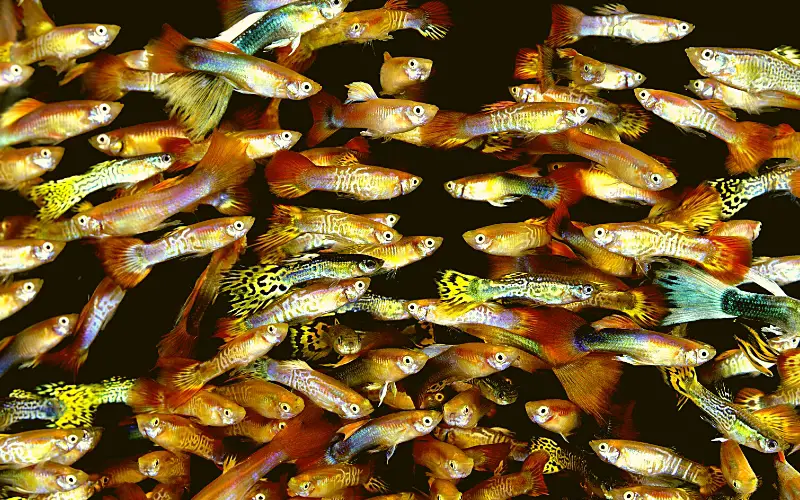
The fry will stay close to their mother for the first few days after birth to get food and protection from predators. Guppies breed quickly, so it’s not uncommon to see large numbers of babies!
How Many Babies Does a Guppy Have the First Time She Gives Birth?
For the first time she gives birth, a pregnant female guppy will have between 8 and 35 fries. This number can vary depending on the size and age of the female guppy, as well as the water temperature and pH levels.
In general, larger and older guppies tend to have more live fry. The size of the brood also depends on the number of male guppies in the fish tank. If there are more males, the female guppy fish will have a more prominent family as she stores sperm from multiple males.
Do Guppies Give Birth All at Once?
Do guppies have their babies all at once? Guppies have a unique way of reproducing! The female fish typically give birth to live fry one by one in a short burst, with each bundle of baby guppies born curled up into little balls – just as they had developed inside the mother.
When a pregnant guppy is about to give birth, she often swims away from the rest of the fish to find a safe place. Then, the fry is released, one by one, within a matter of minutes. This process can be repeated multiple times over a day or two.
How Long Is a Guppy in Labor?
On average, a guppy in labor will take 5 to 12 hours, depending on the number of fries (baby guppies) she carries. The gestation period for a female guppy is usually between 21 and 30 days. However, it can vary from as few as 20 up to 32 days after mating.
During this time, the eggs incubate inside her body until they are ready to be released. Signs that a female guppy is close to giving birth include a slightly curved back, sitting near the water’s surface, and darkened gravid spot (the area behind her vent).
When labor begins, she may thrash around or hang vertically in the water column while releasing her young one at a time.
After all of them have been released, you must remove any male fish from your tank to prevent further breeding, as guppies can become pregnant again almost immediately after giving birth!
How Often Do Guppies Have Babies?
Guppies reproduce quickly and can have babies about every 30 days. This is due to their short life cycle, which allows them to produce offspring rapidly.
For example, if conditions are right, a female guppy can give birth to anywhere between 10-100 young in one batch of lay eggs. Furthermore, the sexually mature female guppies can become pregnant again shortly after giving birth and thus continue the reproduction cycle.
Therefore, keep a good eye on the number of breed guppies in your tank and be willing to move excess fish to a different tank if necessary. This will ensure that all fish have enough space and resources while allowing them to reproduce naturally.
Overall, guppies can reproduce quickly and easily in the right conditions. Proper care and maintenance allow a well-maintained aquarium to be filled with colorful and lively guppies in no time!
Despite the rapid reproduction of guppies, it is essential to remember that they are still living creatures and must be cared for responsibly. Being informed about the breeding habits of pregnant guppies will help ensure that your fish population is healthy and balanced.
Additionally, it is essential to remember that each guppy fish has a unique personality and should be treated respectfully. If you take the time to get to know your fish, you will be rewarded with a thriving and vibrant aquarium filled with happy guppies.
How Long Is a Guppy Pregnant For?
How long does a guppy stay pregnant? A Pregnant guppy’s gestation period typically lasts between 21–30 days. Females can produce around 100 or more baby fish in a single litter, with about two to four litters per year.
It’s essential to keep the water clean and well-oxygenated during these periods, as it is necessary to develop the young fry (baby fish) properly.
Additionally, keeping an eye out for signs of stress, such as rapid breathing and paler coloration, will aid in ensuring their well-being during this time.
How to Know When Guppy Is Finished Giving Birth?
When a female guppy fish is finished giving birth, she will become less active and may spend more time hiding in the corners of her tank. The mother may also begin to look for food shortly after giving birth.
Other signs that the guppy is finished with labor include fewer eggs in her body, a decreased amount of milk she produces, and more occasional guppy fry swimming around the tank.
If a female guppy has any remaining eggs in her body, they may be released over the next few days.
Watching the pregnant guppy for the first few days after giving birth is essential. Even though she may have stopped producing milk, it is still necessary that she has plenty of food and rest so she can heal from the labor process.
How Fast Do Newborn Guppies Grow?
Newborn guppies grow incredibly quickly. They can double their size in as little as ten days or less! However, the exact growth rate varies based on environmental factors such as temperature, the quality and availability of food, and general health in the tank.
Generally speaking, the newborn fry can reach 2‒3 cm long within three weeks to a month with reasonable care and adequate nutrition. After this point, their growth slows slightly; however, they’ll still double in size again after an additional 1-2 months.
To ensure your young guppies reach their full potential, you should provide them with optimal conditions such as clear water free from nitrate and ammonia buildup, a stable temperature between 23°C–27°C (73°F–81°F).
Balanced nutrition including high-quality plant matter for foraging such as spirulina flakes, live foods like brine shrimp or Daphnia magna if possible; plus plenty of places to hide from predators like other fish species or even human fingers!
How Many Guppy Fry Usually Survive?
On average, around 50% of guppy fry survive their first few weeks after hatching. This can vary depending on their habitat conditions and how well they’re cared for.
A healthy guppies environment with clean water, good quality food, plenty of hiding spaces, and minimal stress factors can help increase the survival rate to over 80%.
It’s essential to get rid of any uneaten food, which can quickly pollute the tank and any dead fry before they have a chance to decay. To ensure the health and success of your guppy fry,
It’s also a good idea to watch your fish for signs of disease or stress. With proper care, you can help increase your guppy fry’s chance of survival and enjoy the rewards of a thriving and vibrant aquarium filled with happy guppies.
Do Guppies Eat Their Babies?
It’s common for adult guppies to eat their fry. This is especially true if the tank is overcrowded or needs more adult food. The young fry can also be seen as a tasty and easy snack for their parents!
Guppies have been known to turn on their fry, consumed by instinctual desires for free food and energy replenishment.
Thankfully, however, three methods can be used to prevent these fish from becoming cannibals – manually separating adults from the young, employing a guppy breeding enclosure or mesh – providing safety for future generations of guppy!
What Do Baby Guppies Eat?
Baby guppies are omnivorous, meaning they eat both meat and plant matter. In their natural environment, baby guppies feed on small insects, larvae, worms, and plant matter like algae.
The best food for baby guppies in a home aquarium setting is specially formulated fish flakes or pellets explicitly designed for fry (baby fish).
This will provide them with a good source of nutrients and vitamins. In addition to fish flakes or pellets, you can also supplement their diet with bloodworms, microworms, DaphniaDaphnia, baby brine shrimp, and egg yolk paste as occasional treats.
Be sure not to overfeed your fry since that can lead to swim bladder issues later in life!
Do Guppies Give Birth at Night?
Guppies are unique among other fish; they give birth at night, usually between 8 pm and 12 am. This behavior is believed to be a natural way to avoid predators in their environment.
The gestation period of female guppies can last anywhere from 22 to 26 days, and they usually give birth to between 10 – 30 fry in a single litter.
The newborns are self-sufficient, meaning they don’t need their parents to help them survive. They can immediately swim and feed on their own.
A fantastic ability of female guppies is their capacity to retain the sperm from a single male guppy fish for up to 8 months!
This means that over half a year later, these lovable fish can continue reproducing even in environments entirely composed of females – what an incredible feat!
Final Thoughts
So, how many babies do guppies have? In conclusion, Guppies are a reproductively active species that can produce significant offspring in each spawning event. Female guppies typically give birth to anywhere between 50-60 young at one time. However, the size of the litter is greatly influenced by factors such as the age and health of the female guppies and available food resources.
Good water quality is also essential for successfully breeding guppies, and poor water parameters can lead to lower fertility levels or even death. It’s necessary for those who wish to maintain a guppy population to monitor their tanks carefully, ensuring proper nutrition and temperature are provided along with frequent cleanings. Guppies can make great additions to any tank with appropriate attention and dedication!
You might also like
- How to Breed Guppies for Color? (A Comprehensive Guide)
- Guppy Fish Breeding 101: Essential Guide For Successful Raising
- How to Tell If a Guppy Is Pregnant? (Exact Signs & Behavior)
- How to Stop Guppies from Breeding? (9 Effective Ways & FAQ)
- Guppy Fish Swim Bladder Disease: 58 Seconds to Save Your Fish!


